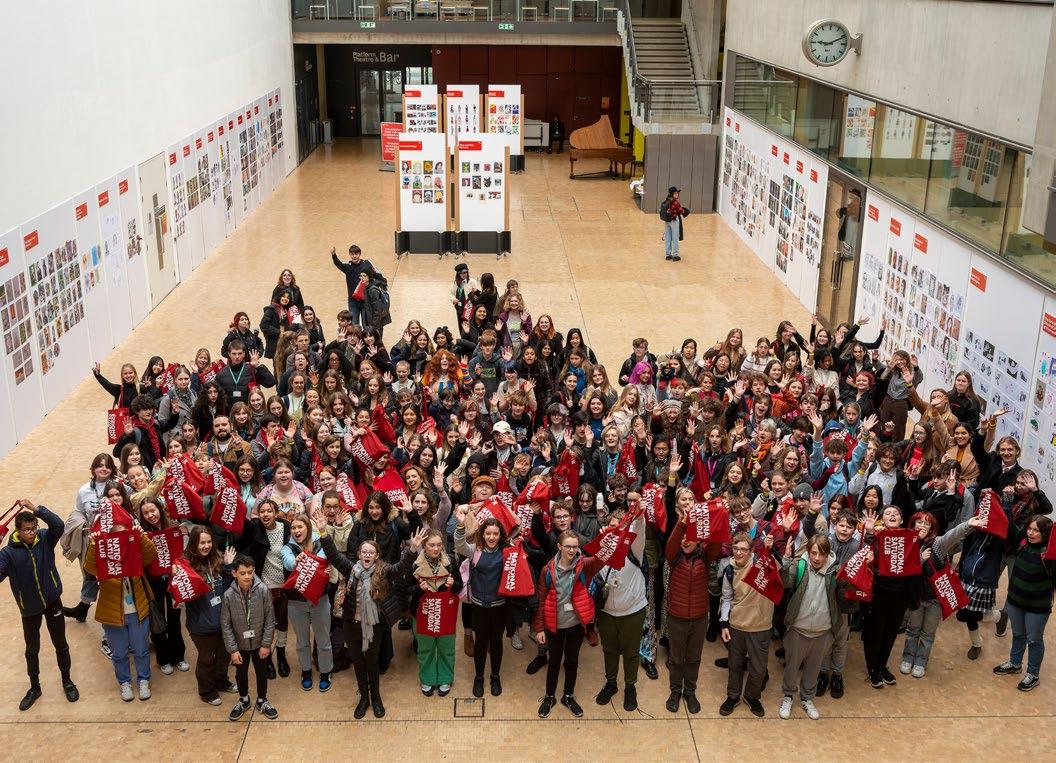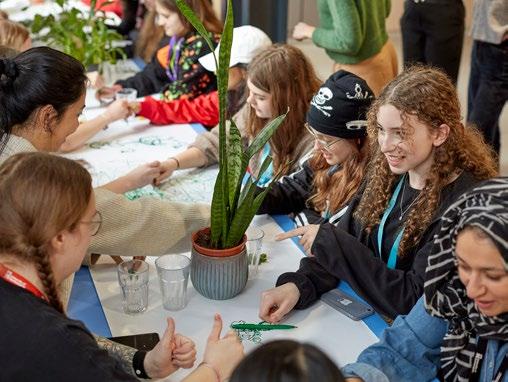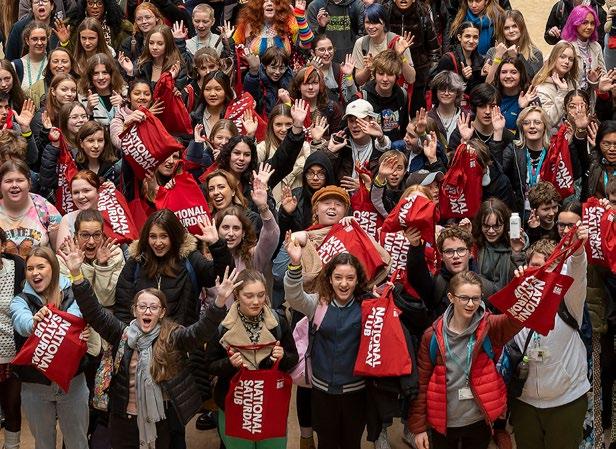
8 minute read
By design: a powerful network
Since its launch in 2009, the National Saturday Club has evolved from a small pilot scheme to a nationwide organisation with a far-reaching impact. Its steady growth has been enabled by the Club’s essential design – a dynamic network of partners across education, industry and the cultural sector. Here we ask a selection of our educational partners to share their views on how the model enhances their capacity to empower young people.
The model for the fledging National Saturday Club had connectivity and scalability embedded in its blueprint. The early organisation’s hub-and-spoke framework – a compact central management team working in collaboration with a handful of educational institutions and industry professionals – has transformed into a widespread network of 72 partner universities, colleges and cultural institutions, working together to reach 1,800 young people throughout the UK in 2022–23. The defining feature of the model, these interconnected partnerships ensure the National Saturday Club remains a highly dynamic, cost-effective and flexible entity capable of functioning on multiple levels to deliver high-quality extracurricular education to a broad demographic of 13–16-year-olds.
Advertisement
“The National Saturday Club offers an excellent balance for learning providers and institutions seeking to develop their outreach offer. It provides a blueprint, and a clear structure and format, while leaving plenty of space for imagination and innovation in course design,”
Contributors
Sandra Booth
Council for Higher Education in Art & Design
Georgia de Buriatte
Winchester School of Art
Lisa Edwards
Bradford College
Dr Rhiannon Jones and Professor Keith McLay
University of Derby
Dr Neal Shasore
London School of Architecture
James Ward
Anglia Ruskin University says Dr Neal Shasore, Head of School and Chief Executive of the London School of Architecture (LSA), a National Saturday Club partner since 2022.
“Our Saturday Club programme, ‘(Un)Building’, is the first dedicated to architecture, and it seeks to introduce students to bold ideas around the circular economy and sustainable design, and to a range of actors involved in the production of the built environment.”
Commenting on the way in which the LSA works with the National Saturday Club and the Club’s impact on both the School and its surrounding community, Neal continues:
“Having a central team on call to provide advice and encouragement is hugely reassuring, and drawing on the expertise of others within the network to test ideas is invaluable. Partnership with the Saturday Club over just one year has already added an immense amount to the LSA. There is pride in the programme across the organisation, from students and alumni to our administrative team, including faculty. We are immensely proud that 86% of participants in our Saturday Club pilot were of Global Majority heritage. The programme has thereby further catalysed our commitment to widening participation, and indeed has provided an ideal format for us to push forward on our Access and Participation Plan targets.”
As a longstanding educational partner, James Ward, Head of School, Cambridge School of Creative Industries at Anglia Ruskin University, points to core elements of the Saturday Club’s year-long programme that benefit both his institution and Club members in potent ways:
“Having worked in partnership with the National Saturday Club for over a decade, I have witnessed the advantages this unique model offers. The sharing of good practice for teaching sessions has been very beneficial to new academics in developing their careers. The industry Masterclass adds additional prestige to the opportunities young Club members have on a weekly basis, while the final exhibition at Somerset House can be a life-changing experience. The latter is witnessed when schoolteachers report back to the Club that after the young people have seen their work exhibited, they return to their studies with a confidence and enthusiasm that enables them to reach their full potential.”
For Lisa Edwards, Learning and Quality Manager at Bradford College, which became a partner in 2013, frequent communication and sharing of information with the National Saturday Club’s management team are two important aspects of the model that have helped strengthen her institution’s engagement with the Club programme:
“This year has been a huge success for us. We have progressed from very little uptake for our Art&Design Club to a vibrant and busy Club and related creative community. This was the result of regular review meetings with a National Saturday Club director, which helped change the way in which we operate the Club and the vision of our department. We are extremely proud of the distance we have travelled and the growth of our Saturday Club, which wouldn’t have been possible without this support.”
Lisa also notes the impact that running a Saturday Club has had on her community at large:
“Bradford is the fifth largest local authority in England in terms of population size, and 26% of our population is under 18. It’s been particularly important to offer extracurricular activities to our young people, as 22% of children in Bradford live below the poverty line. Providing free Art&Design classes and access to tutors who are passionate about arts education, as well as industry professionals working in the creative industries, has had a transformative effect on many of the Club members who have joined the programme. We have seen vocational curriculum applications from our Club members and noted their achievements in our Level Two and Three curricula.”
As the partners above testify, the relationships between the National Saturday Club and the educational institutions that host its programme have the virtue of being mutually beneficial. The National Saturday Club can offer its collaborators a tried-and-tested programme framework, which can be nuanced to match the partner’s individual resources and outreach targets; and by return, the Club is able to give its young members access to top-level teaching environments that yield, as regular evaluation shows, numerous positive outcomes, including skill development, increased confidence and a greater awareness of further education and career options.

Professor Keith McLay, Provost, Learning and Teaching, Office of the Vice Chancellor, and Dr Rhiannon Jones, Associate Professor (Civic), at the University of Derby, a partner since 2022, highlight the ways in which the Saturday Club model aligns with their own institutional aims:
“As a Civic University, we have been able to co-design a unique delivery framework for our Society&Change Saturday Club, and the network we have created to enable this resonates absolutely with our ambitions as an institution. We are encouraging the next generation to think about citizenship, physically bringing them into the university space, and introducing them to other civic organisations in and around Derby.
“Running a Saturday Club at the University has enabled staff, students and external stakeholders from across our region to come together to create an outlet for young people to be creative, and to explore and develop their skills and interests. It has also provided them with a platform to share their thoughts and ideas locally, such as when we exhibited a range of their artwork this year at Derby County Football Club. Through working with volunteers, freelancers and early-career creatives, among others, to deliver a Saturday Club programme to inspire and inform everyone, an entire creative ecosystem has taken shape.”
As linchpins of the National Saturday Club ecosystem, Club tutors and student assistants frequently relay the significant benefits of a network structure that allows them to exchange information and pedagogical knowledge with their Club colleagues, and fellow further and higher education practitioners. Georgia de Buriatte, Access and Participation Tutor at Winchester School of Art, University of Southampton, and a member of the National Saturday Club Tutors’ Advisory Group, reflects on her personal experience:
“I was fairly new to teaching when I began tutoring a Saturday Club, so the Tutors’ Programme was an invaluable resource for me in terms of sharing best practice and pedagogy. The ability to meet and talk to other Club tutors creates a strong support network of like-minded professionals able to help you with any sticking points. Many elements of my current educational practice have been influenced by methods, tips and tricks that I have discussed with other Club tutors who have different backgrounds and life experience. The depth and variety of this knowledge has benefited my teaching in innumerable ways, making me a better and more empathetic practitioner for my students.”
The diversity of the National Saturday Club network lends the organisation powerful tools for growth, the plan for which is ambitious: to double the current number of Saturday Clubs by 2026. The model to facilitate this must be robust, and agile. The Club’s partnership structure has shown that it can be leveraged to allow for this development while maintaining a high standard of delivery and a collective alignment with the organisation’s foundational aim: to nurture young people’s skills and capabilities, and aid their advancement to further education and rewarding careers.
Sandra Booth, Director of Policy and External Relations at the Council for Higher Education in Art & Design (CHEAD), offers her opinion on the beneficial influence of the model on a young person’s educational experience and the network at large:
“By drawing on a wide range of pedagogies, perspectives and practices, effective partner networks such as the National Saturday Club enhance the capacities of all participants and providers. This enables the whole ecosystem to deliver a more sustainable and scaleable impact through collaborative rather than individual actions. Good communication, strong connectivity, shared values and a compelling common purpose bind the organisation together, allowing it to have an impact in numerous positive ways.
“Access and participation are crucial to foster inclusivity and transform the experiences and aspirations of a diverse and talented community of young people. Extracurricular creative education opens up young people’s hearts and minds to opportunities to selfactualise, experiment, express themselves and explore pathways to creative futures. Many are excluded from formal arts education and face other social, geographical and economic barriers, which the National Saturday Club consistently challenges.”
Our data shows…
98% of Club members agreed that the tutors were supportive and approachable
96% found the atmosphere at the Club welcoming and inclusive
96% found the classes engaging
84% said they had access to specialist equipment through their weekly classes
Over 14 years
13,500 young people have taken part

120 universities, colleges and cultural institutions have hosted Saturday Clubs
360 bespoke cultural visits have taken place
410 industry-led Masterclasses have taken place
660 Clubs have exhibited at the Summer Show at Somerset House
An idea with an eye on the future
As for many noted artists, designers and cultural leaders of their generation, John and Frances Sorrell’s early engagement with free post-war Saturday art classes paved the way for their careers and significant achievements in the creative industries.
After building a successful design business, they founded The Sorrell Foundation in 1999 to inspire creativity in young people. Using methods developed in their business, they devised programmes that would help schoolchildren explore their creativity and develop core skills, while working alongside professional designers and students on special projects. Over a span of 10 years, these projects involved thousands of children of all ages across the UK, and the learning from them formed the building blocks of the National Saturday Club.
The National Saturday Club was launched in 2009 for 13–16-yearolds. The ambition was to reimagine the Saturday classes that the Sorrells had benefited from as teenagers and offer young people free tuition in colleges, universities and other institutions, where they would have the time, space and facilities to develop their creativity and learn new skills.
In 2016, the Saturday Club Trust took over the development of the National Saturday Club network. The current reach of the Club, its span of eight subjects and evidenced impacts, reveal a network model that is transformative for Club members. For the nationwide partners and individuals who make delivering Saturday Clubs possible, it is a potent agent for allowing young people from all backgrounds to advance their talents and ambitions.



